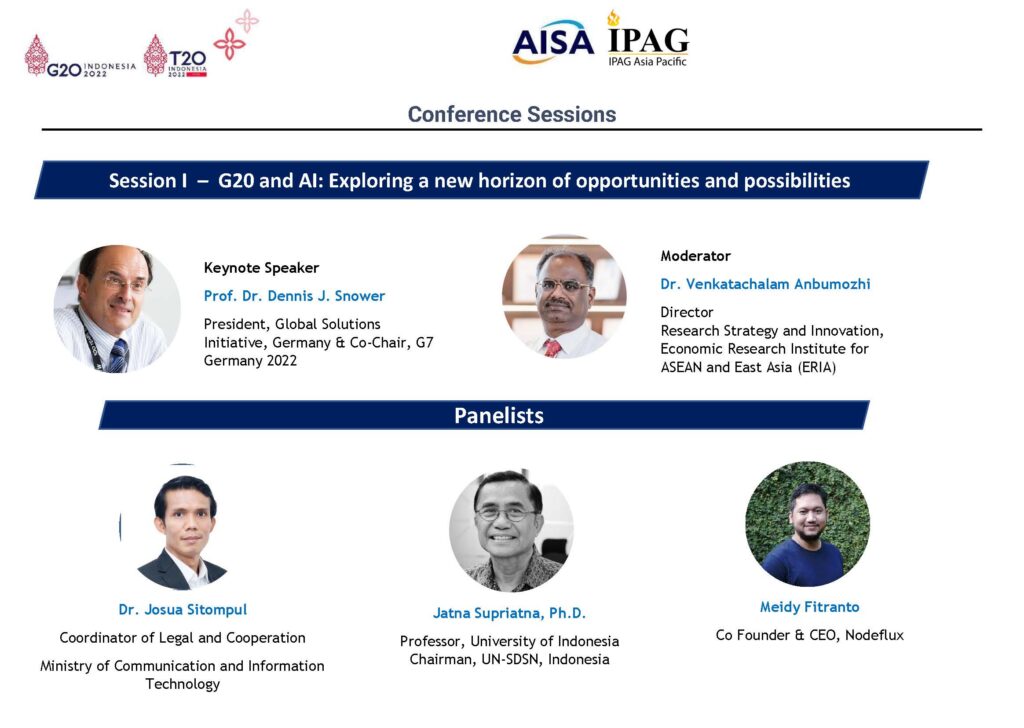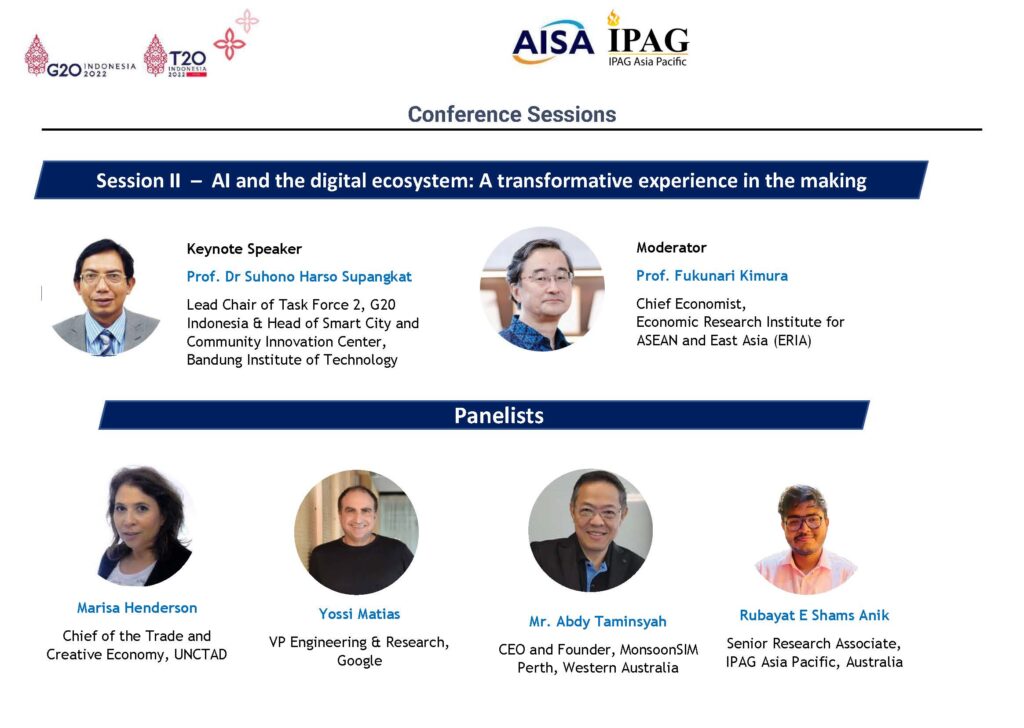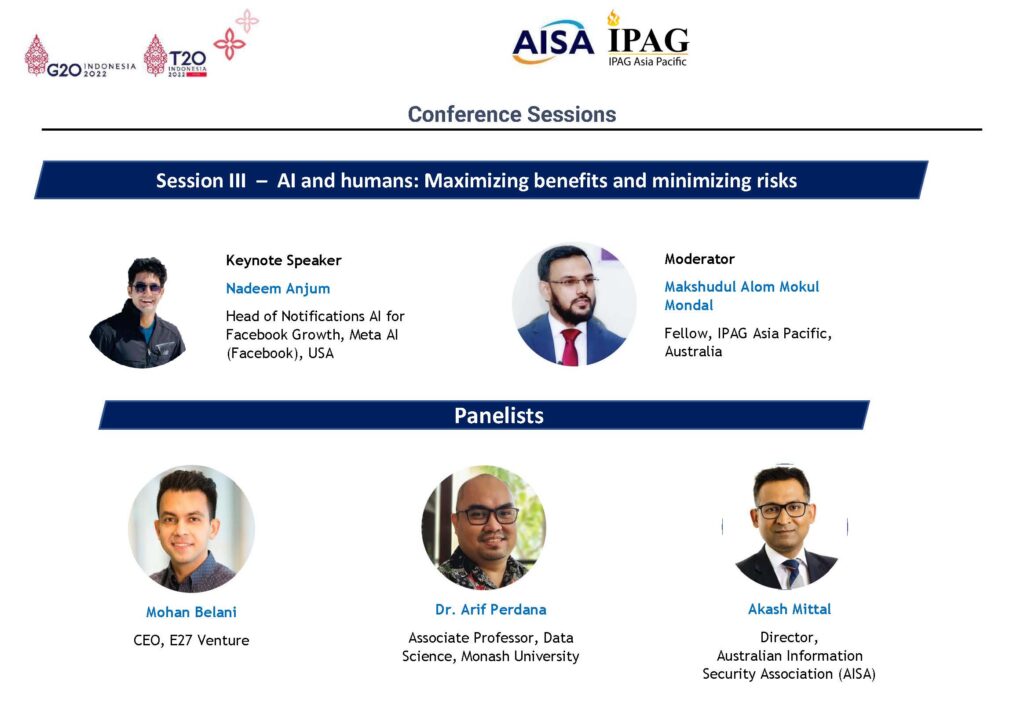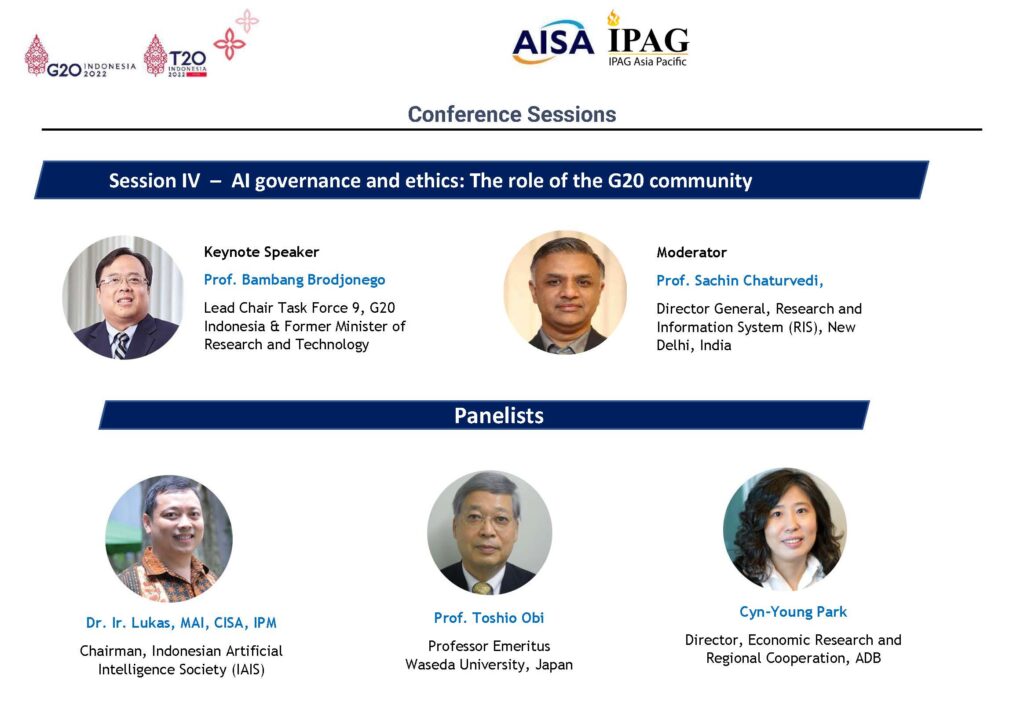“G20 and AI: Connecting the dotted lines between technology and humanity”, hosted by IPAG Asia Pacific, Australian Information Security Association (AISA), and SCICC was a T20 Indonesia side event that focused exclusively on undeniably the most important aspect of the digital society, Artificial Intelligence. Guest speakers consisting of some of the most skilled veterans in the field were invited to share their thoughts and guidance towards the rapid and inevitable transition towards a future, driven by mainstream Artificial Intelligence (AI).

SESSION I: Exploring A New Horizon of Opportunity
To build a better future, the G20 needs to raise the level of ambition and digital co-operation. This is particularly important for new technologies such as AI, quantum computing, blockchain, Internet of Things, among others. There have been an emergence of AI in various fields including natural language processing, communicational AI, and AI surveillance software that is not only beneficial but also potential threats, should the technology fall into wrong hands.
AI needs to progress responsibly while addressing the risks. Responsible development and use of AI can help advance SDGs; supporting a sustainable and inclusive society while mitigating risks to wider societal values of equity, access, and fairness. Benefits brought by responsible use of AI can improve the work environment and quality of life, creating potential for realizing a human-centered future society providing opportunities to everyone.
The session focused on adopting a multi-stakeholder approach towards AI adoption by supporting standards that help transition to an increasingly digital society. The successful incorporation of AI requires public administrations to redefine strategies based on emerging technologies and to develop a functional governance structure. It exchanged views on how G20 can help achieve an inclusive, sustainable, and innovative society through digitalization. The importance of international cooperation for harnessing full potential of emerging technologies like AI was also discussed which includes enhanced research and development as well as policy formulation for the global citizenry.
Moderator Anbhumozi started the session providing insights on how Artificial intelligence is being used as a tool nowadays and the challenges faced by countries in adopting AI with primarily four things to consider: (i) AI versus privacy, (ii) AI versus employment, (iii) AI versus social coherence, and (iv) AI versus humanity.
Keynote Presenter Prof. Dr. Dennis J. Snower started with poignant observation “What is guiding AI? What is the engine pushing AI? – it is the people who control the systems.” He further commented that digital services are different. There are a lot of free apps where we provide information even without consent as we become influenced. As long as this system continues, AI will be driven by it. There is nothing in the system that guarantees the AI will make things either vulnerable or fully secured.
What can be done includes the (i) Once the data are being used, all official data must receive official authentication, so the users have an authenticated id. (ii) Data subjects will be the only legal source. (iii) To create a legal structure that supports data commons. These data commons will be under the control of the company or organization that promotes benefits to those who share the commons. (iv) Addressing powers of AI.
1st Panelist Dr. Jatna Supriatna spoke about the experience of land use in Indonesia. After long discussion, the government of Indonesia has decided to use AI. For example, there is application of AI in helping artificial rain to tackle wildfire. Hence, the belief is that with the help of AI, Indonesia can help its citizens reap benefits of newly emerging technologies like the AI.
2nd Panelist Dr. Josua Sitompul oberved how AI seems similar to other technologies, which bring opportunity and emphasized on the need to (i) Facilitate newly emerging technologies like AI (ii) Protect the society from the negative impact from the technology. He posed the question, “Can we see or trust AI in our daily activities?”
3rd Panelist Meidy Fitranto stated how every technology has both good and bad impact. The issues identified by him includes (i) Collaboration is much needed to effectively address the economics and globalization of AI. (ii) Secondly, the use of AI should be enhanced to increase productivity and efficiency.
During the intra-panel discussion, Dr. Jatna Supriatna shared the legal aspect of AI and the need to build trust in the community since there are a lot of unforeseen consequences. As the government

SESSION II: AI and The Digital Ecosystem
Digitalization is expected to beneficial for economies and societies in the long run. The use of emerging technologies such as artificial intelligence (AI), fifth-generation mobile telecommunication technologies (5G), the Internet of Things (IoT), Distributed Ledger Technologies (e.g. block chain) is expected to increase productivity in the economy significantly. These newly emerged technologies will create new opportunities and generate economic value through employment and service creation – empowering whichever nations (G20 and beyond) adopts the technologies first. The new economic value generated, if regulated and encouraged properly, is expected to improve well-being and societal inclusiveness for all citizens of the nation.
G20 nations are already embracing the evolution of innovative technologies to the Artificial Intelligence (AI). Leading AI adoption policies by countries around the world includes the USs’ American AI Initiative in 2019 dedicated to build the AI workforce, China’s Next-Generation Artificial Intelligence Development plan in 2017, UK’s updated the AI strategy called the “AI Sector Deal”, Canada’s CA$ 25 million investment under the Pan-Canadian Artificial Intelligence Strategy in 2017, and Australia’s multiple ambitious AI strategies and plans to promote the AI research & development and creating local AI employment opportunities.
Following such wide adoption of AI policies around the world, the second session of the conference focused on the importance of AI-led digital ecosystem adoption by the G20 and beyond. The panel was led with the keynote presentation by Prof. Dr Suhono Harso Supangkat’s (Co-Chair of Task Force 2, T20 Indonesia), leading with the moto “Change is coming, and we have to adapt”. As we rapidly move towards the inevitable approach of mainstream AI, Dr Suhono encouraged all countries to implement the correct adaptation methods of AI into economic models to embrace the change.
The session was moderated by Prof. Fukunari Kimura (Chief Economist of ERIA) with panelists Dr. Marisa Henderson (Chief of Trade and Creative Economy, UNCTAD), Yossi Matias (VP Engineering & Research, Google), Mr. Abdy Taminsyah (CEO and Founder, MonsoonSIM, Western Australia, Australia) and Mr. Rubayat E Shams Anik (Senior Research Associate, IPAG Asia Pacific, Australia).
The session highlighted the focus back to the G20, and how it is committed to promoting policies to share benefits from digitalization of economies and societies. 1st speaker Dr. Marisa led the discussion on how the G20 can design and implement policies to maximize benefits and minimize risks from development of a complete digital ecosystem to embrace the AI adoption. 2nd speaker Mr. Matias and 3rd speaker Mr. Abdy emphasized on overcoming the resulting challenges to adoption of the digital ecosystem. Mr. Rubayat followed up with the vital impact of recent events on the development and implementation of AI to justify whether accelerating the adoption is actually feasible. The key focus of the session was adoption of a digital ecosystem that supports transition to novel way of thinking and working unleashed by AI. As human civilization leaps into a new frontier of technology enabled lifestyle and living, the challenge is to make the transformative experience rewarding and accessible to all.

SESSION III: AI and Humans
As various government are deciding on what policies to develop amidst the explosive growth of use of AI across various businesses, it is equally important to analyze the benefits it offers and the risks to consider. The third session revolved around the need to utilize the benefits of adopting AI while mitigating the risks. The session also explored how some of the international bodies could serve as focal points to develop a common framework to regulate the digital environment. As the human-machine interface enters a new phase, its necessary to navigate the delicate balance where human ingenuity is complemented and not upstaged by the machine-driven efficiency.
AI is a governable and interoperable technology that aims to eradicate or minimize inequalities – a crucial components for multilateral platforms and international group of cooperation such as the G20. Like any other emerging technologies, AI also presents societal challenges, including transitions in the labour market and presenting new issues related to privacy, security, ethics, and digital divides. In pursuing human-centered AI, G20 needs to recognize the importance of promoting protection of privacy and personal data across countries within and beyond the G20 community. It also needs to recognize the need to promote AI capacity building and skills development.
This is why keynote speaker Mr. Nadeem Anjum started off the session with a famous quote from the renowned futurist and techno philosopher Gray Scott: “There is no reason and no way that a human mind can keep up with an Artificial intelligence machine by 2035”, which undoubtedly emphasizes the complexity in the nature of AI, and how it can bring about as much devastation as benefits, if left to the wrong hands. AI by itself is amoral – it’s a virtual entity that processes no human emotion or empathy to determine right from wrong. The risks add up as the AI’s learning process revolves around humans, and naturally reflect as well as amplify human biases. This also comes at the expense of immense amount of processing power requirements and vast precious metals being used.
Gray Scott’s infamous quote also comes to light as we see AI rendering thousands of people unemployed even at its current state. There is solid justification for this compromise however, as we can see AI performing tirelessly and with peak efficiency 24/7 around the clock, even in case of the most mentally exhausting and mundane jobs and with nearly no errors. This is a feat not achievable by the smartest humans, and the benefits only stem from there. While AI focuses on the tedious task, humans are left with the opportunity to focus on more interesting, challenging and harder problems. But to leave AI unregulated is dangerous, and as remedy comes the concept of “Ethical AI”.
Keynote speaker Mr. Anjum further indicated to the algorithms controlled by AI in this instance, and how they may end up promoting harmful content in the process of maximizing engagement. This is why, prioritizing user interest, data security & privacy will help eliminate the risk of AI maximizing corporate profits over welfare. He ended his speech with an invitation to put cumulative effort in order to mitigate the risks that come with AI and transform it to our greatest ally.
The panel discussion continued under the moderation of Mr. Makshudul Alom Mokul Mondal, representing IPAG Asia Pacific, Australia. 1st panelist Mr. Mohan Belani introduced how his organization E27 has been incorporating and utilizing AI to it’s maximum potential through investing into successful business ventures and start-ups. He indicated nature of AI to being relatable and fluid as a knife or a weapon, neither good or bad. It can be beneficial depending on the user and his or her intention. Mr. Belani further specified how, public institutions, education organizations, companies and policy makers’ need to perceive AI in a positive light to reap the benefits. Through proper management AI can be used in the best of potential.
2nd panelist Dr. Arif Perdana quoted Vladimir Putin “Whoever can control AI can control the world,” referring to its impacts to be positive or negative depending on who yields the technology – a similar argument of 1st panelist Mr. Belani. However, acting as the devil’s advocate, 2nd panelist Dr. Perdana dived deep into the negative aspects of AI such as digital discriminations, the lack of clear policies and regulations from the organizational bodies or the government. 2nd panelist Dr. Perdana further elaborated on the importance of Human Algorithm Interactions and System Development Lifecycles in extracting unbiased results, and eventually evolving AI into a properly regulated entity.
3rd panelist Mr. Akash Mittal addressed the risks that need to be managed surrounding AI. In his speech he classifies the regulatory bodies or policymakers into three main stakeholders: the government, the key organizations driving the AI and finally the end users. Oftentimes it is common for the corporations to be held accountable in the case of discrepancies, yet the primary obstruction could have been the lack of adequate knowledge of AI. While the governments try to catch up to the corporations, the end users often have limited to no idea about the functionality and proper usability of AI. There needs to be a mutual consensus between all three parties. This could be achieved through the education sector by the addition of new courses related to AI.

SESSION IV: AI Governance and Ethics The Role of the G20 community
Issues related to privacy and security in the digital economy are central concerns to the domain of public policy as citizens embrace introduction of big data collection related to artificial intelligence (AI). Citizens seek assurance that AI and automation will be introduced in a manner that respects human integrity and functions within a framework of accountability. While delivering productivity, key issues like safety and privacy need to be adequately addressed. The session highlighted the role of the G20 and how it is committed to promoting a free, open and secure internet that encourages the digital industry to work with stakeholders in fighting misuse of the internet and social media and also safeguarding against violent extremism and addressing content that incites terrorist acts.
As AI grows exponentially, there is an increased need of sustainable technological incorporation to the businesses as well as workforces. Thus, there is a need for AI ethical principle where technology and humanity merges across a blurred line. This session covered the need for recognizing the whole of AI technology in all perspectives – including the ethical principle it should follow. The session emphasized on recommendations and principles that G20 leaders could formulate in developing an accountability framework.
The session exploredg potentials of digitalization and addressing concerns that it brings along, including adoption of international standardization on AI led by the G20. Keynote presenter Prof. Bambang Brodjonegoro, the lead chair of the T20 Indonesia, shared how the growth and the advancement of AI has been integral part of our life for the last 5 years, be it at medical processes to logistic systems and most commonly used AI technology – such as our smartphones.
As a part of the world’s digital transformation, keynote speaker Prof. Bambang argued, how adapting to AI technology is inevitable. Indonesia itself has been reaping economic advantages of efficiency, as logistics costs fell 30% because of AI integration. He emphasized Importance of AI Ethics, especially considering its importance in data governance for privacy and security. He further discusses the concept of “Responsible AI”, which is the practice of designing, developing and employing AI with a good intention to empower employees and businesses. He ends his speech with the role of “Responsible AI” in eliminating AI Bias.
The session continued under the moderation of Prof. Sachin Chaturvedi which was participated by panelists Dr. Ir. Lukas, MAI, CISA, IPM, who referred to the increased productive efficiency that was possible by the introduction of AI. 2nd panelist Prof. Toshio Obi and 3rd panelist Ms. Cyn-Young Park discussed about the massive development of AI in the last 5 years was the emphasizing point in keynote speaker Prof. Bambang’s opening speech. Further, 1st panelist Dr. Ir. Lukas and 2nd panelist Prof. Toshio Obi followed up by introducing the staggering potential of utilizing Big Data, Information security and Block Chain technology, to all of which AI can be the master key. 3rd panelist Ms. Park concluded the list of potentials with an incredible potential change AI can bring to work-life balance in our lives.